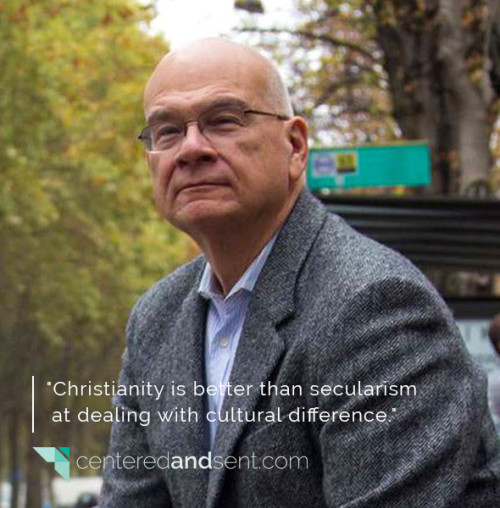On October 18 and 19, right here at The Summit Church, we’re hosting a conference called “Centered and Sent.” The idea is that the more centered we are in the Word of God, the more sent we become as the people of God. Centered and Sent is going to focus on how the church can stay radically distinct and still be culturally relevant. As our society grows increasingly post-Christian—and often anti-Christian—we’ll need this more than ever.
This conference is going to be phenomenal. We’re going to have church leaders coming here from all across the country. And the lineup of speakers is a perfect fit for the conference theme. We’ll have a lot of our Summit pastors contributing, talking about local outreach, engagement in politics, and ministry among the LGBT community. We’re also bringing in leaders like Bryan Loritts, Joby Martin, Ed Stetzer … and the Summit’s Yoda himself:
That’s right. Tim Keller will be there. Tim Keller, who does something like one conference every three years.
I’ll be speaking about our need to pursue attractional and missional ministry at the same time. If you’re curious, here’s a hint of what I’ll be sharing:
Attractional Ministry: De-Cluttering the Court of the Gentiles
The maddest we see Jesus get in the Gospels seems to be when he observes Jewish leaders cluttering up of the court of the Gentiles with conveniences for the saved. Just before his death, he went to the temple and saw that the court had been overrun by peddlers selling sacrifices to be used in temple worship. Not only was Jesus angry over the sheer attempt to profiteer from the ministry; he was also angry that they had consumed the only space Gentiles had to draw close to God. With the backing of a whip, Jesus exclaimed, “My house was intended to be house of prayer for all nations, but you have turned it into a den of thieves” (Mark 11:17, paraphrase).
Jesus was angry not only at what they were doing, but also at what they were obscuring. They had transformed the only open-access point for the Gentiles into a catalogue of comforts and conveniences for the already saved. They had transformed a portal for the outsider into a butler for the insider.
Why would we think that Jesus feels any differently about the way many churches today make no accommodations to make the gospel accessible to outsiders—in their preaching, music, language, practice of traditions, children’s programs, and even things like parking and signage? By not thinking of the “observing outsiders” whom God is drawing to himself during our worship, are we not creating the same roadblocks for “Gentiles” as the Jews did in Jesus’ day? How must Jesus feel when a church refuses even to consider what it needs to change to reach the community and the next generation?
Missional Ministry: Why Sending Capacity Matters More Than Seating Capacity
Even in our increasingly post-Christian setting, attractional ministry—the “come and see” variety—still matters. But Jesus’ vision for completing the Great Commission never consisted in platforming a few hyper-anointed megapastors to pack an auditorium with their electrifying sermons. His vision for completing the Great Commission was to empower ordinary believers to carry the gospel with them into the streets. If we really want to see the power of God, it’s not going to be primarily found in the pulpit. I’m all for the pulpit, but the real power will be released as ordinary, Spirit-filled people take the gospel wherever they go, into every part of our community.
We’ve got to begin focusing on empowering and equipping those in our church for ministry. Everyone loves seeing attendance numbers grow, but incremental growth won’t make a difference for 99% of the people in my city—or in yours. So our preaching needs to empower our people to multiply God’s power where they already are. As Paul says, God “gave the apostles, the prophets, the evangelists, the shepherds and teachers to equip the saints for the work of ministry” (Eph. 4:11–12). That means that when I became a pastor, I left the ministry. I simply can’t reach everyone where they are. Neither can you. But the people in our congregations can.
Get this: Of the 40 miracles recorded in Acts, 39 happen outside the church walls. The main place God wants to manifest his power isn’t through masterful preaching or a musical crescendo on the weekend; it’s through ordinary believers throughout the week. The way we say it at our church is that “sending capacity,” not seating capacity, is the best measure of a church’s success.
The bottom line? Faithful churches pursue both width and depth, because neither is really possible without the other. Depth in the gospel leads to width in the mission. The more centered we are in the Word of God, the more sent we become as the people of God.
Don’t miss your chance to join this Centered and Sent conference. Register today, and I’ll see you in October!

